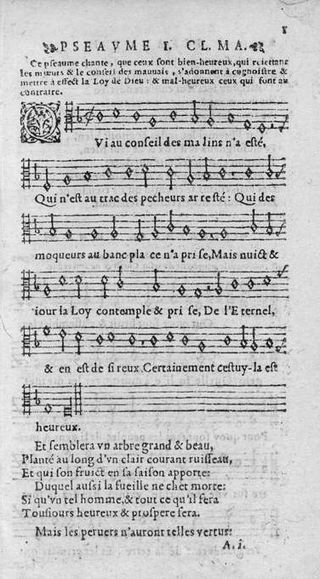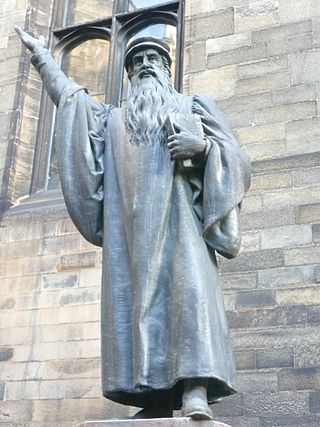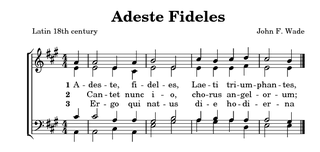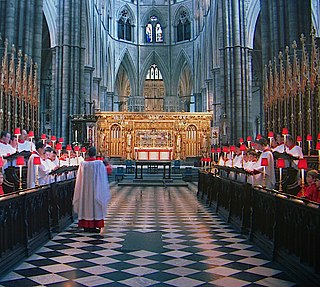
A hymn is a type of song, and partially synonymous with devotional song, specifically written for the purpose of adoration or prayer, and typically addressed to a deity or deities, or to a prominent figure or personification. The word hymn derives from Greek ὕμνος (hymnos), which means "a song of praise". A writer of hymns is known as a hymnist. The singing or composition of hymns is called hymnody. Collections of hymns are known as hymnals or hymn books. Hymns may or may not include instrumental accompaniment.

An antiphon is a short chant in Christian ritual, sung as a refrain. The texts of antiphons are the Psalms. Their form was favored by St Ambrose and they feature prominently in Ambrosian chant, but they are used widely in Gregorian chant as well. They may be used during Mass, for the Introit, the Offertory or the Communion. They may also be used in the Liturgy of the Hours, typically for Lauds or Vespers.

Continental Reformed Protestantism is a part of the Calvinist tradition within Protestantism that traces its origin in the European continent. Prominent subgroups are the Dutch Reformed, the Swiss Reformed, the French Reformed (Huguenots), the Hungarian Reformed, and the Waldensian Church in Italy.

A hymnal or hymnary is a collection of hymns, usually in the form of a book, called a hymnbook. They are used in congregational singing. A hymnal may contain only hymn texts ; written melodies are extra, and more recently harmony parts have also been provided.
A carol is a festive song, generally religious but not necessarily connected with Christian church worship, and sometimes accompanied by a dance. A caroller is someone who sings carols, and is said to be carolling.

Isaac Watts was an English Congregational minister, hymn writer, theologian, and logician. He was a prolific and popular hymn writer and is credited with some 750 hymns. His works include "When I Survey the Wondrous Cross", "Joy to the World", and "Our God, Our Help in Ages Past". He is recognized as the "Godfather of English Hymnody"; many of his hymns remain in use today and have been translated into numerous languages.

Congregational churches are Protestant churches in the Calvinist tradition practicing congregationalist church governance, in which each congregation independently and autonomously runs its own affairs.

Christian music is music that has been written to express either personal or a communal belief regarding Christian life and faith. Common themes of Christian music include praise, worship, penitence, and lament, and its forms vary widely around the world. Church music, hymnals, gospel and worship music are a part of Christian media, and also include contemporary Christian music which itself supports numerous Christian styles of music, including hip hop, rock, contemporary worship, and urban contemporary gospel.

West gallery music, also known as Georgian psalmody, refers to the sacred music sung and played in English parish churches, as well as nonconformist chapels, from 1700 to around 1850. In the late 1980s, west gallery music experienced a revival and is now sung by several west gallery "quires" (choirs).

A metrical psalter is a kind of Bible translation: a book containing a verse translation of all or part of the Book of Psalms in vernacular poetry, meant to be sung as hymns in a church. Some metrical psalters include melodies or harmonisations. The composition of metrical psalters was a large enterprise of the Protestant Reformation, especially in its Calvinist manifestation.

Lowell Mason was an American music director and banker who was a leading figure in 19th-century American church music. Lowell composed over 1600 hymn tunes, many of which are often sung today. His best-known work includes an arrangement of Joy to the World and the tune Bethany, which sets the hymn text Nearer, My God, to Thee. Mason also set music to Mary Had A Little Lamb. He is largely credited with introducing music into American public schools, and is considered the first important U.S. music educator. He has also been criticized for helping to largely eliminate the robust tradition of participatory sacred music that flourished in America before his time.

Anglican church music is music that is written for Christian worship in Anglican religious services, forming part of the liturgy. It mostly consists of pieces written to be sung by a church choir, which may sing a cappella or accompanied by an organ.

Church music is Christian music written for performance in church, or any musical setting of ecclesiastical liturgy, or music set to words expressing propositions of a sacred nature, such as a hymn.

In Christianity, worship is the act of attributing reverent honour and homage to God. In the New Testament, various words are used to refer to the term worship. One is proskuneo which means to bow down to God or kings.

Exclusive psalmody is the practice of singing only the biblical Psalms in congregational singing as worship. Today it is practised by several Protestant, especially Reformed denominations. Hymns besides the Psalms have been composed by Christians since the earliest days of the church, but psalms were preferred by the early church and used almost exclusively until the end of the fourth century. During the Protestant Reformation, Martin Luther and many other reformers, including those associated with the Reformed tradition, used hymns as well as psalms, but John Calvin preferred the Psalms and they were the only music allowed for worship in Geneva. This became the norm for the next 200 years of Reformed worship. Hymnody became acceptable again for the Reformed in the middle of the nineteenth century, though several denominations, notably the Reformed Presbyterians, continue the practice of exclusive psalmody.

The Scottish Reformation was the process by which Scotland broke with the Papacy and developed a predominantly Calvinist national Kirk (church), which was strongly Presbyterian in its outlook. It was part of the wider European Protestant Reformation that took place from the sixteenth century.

A hymn tune is the melody of a musical composition to which a hymn text is sung. Musically speaking, a hymn is generally understood to have four-part harmony, a fast harmonic rhythm, with or without refrain or chorus.

Church music in Scotland includes all musical composition and performance of music in the context of Christian worship in Scotland, from the beginnings of Christianisation in the fifth century, to the present day. The sources for Scottish Medieval music are extremely limited due to factors including a turbulent political history, the destructive practices of the Scottish Reformation, the climate and the relatively late arrival of music printing. In the early Middle Ages, ecclesiastical music was dominated by monophonic plainchant, which led to the development of a distinct form of liturgical Celtic chant. It was superseded from the eleventh century by more complex Gregorian chant. In the High Middle Ages, the need for large numbers of singing priests to fulfill the obligations of church services led to the foundation of a system of song schools, to train boys as choristers and priests. From the thirteenth century, Scottish church music was increasingly influenced by continental developments. Monophony was replaced from the fourteenth century by the Ars Nova consisting of complex polyphony. Survivals of works from the first half of the sixteenth century indicate the quality and scope of music that was undertaken at the end of the Medieval period. The outstanding Scottish composer of the first half of the sixteenth century was Robert Carver, who produced complex polyphonic music.

Evensong is a church service traditionally held near sunset focused on singing psalms and other biblical canticles. It is loosely based on the canonical hours of vespers and compline. Old English speakers translated the Latin word vesperas as æfensang, which became 'evensong' in modern English. Typically used in reference to the Anglican daily office's evening liturgy, it can also refer to the pre-Reformation form of vespers or services of evening prayer from other denominations, particularly within the Anglican Use of the Catholic Church.
Church music during the Reformation developed during the Protestant Reformation in two schools of thought, the regulative and normative principles of worship, based on reformers John Calvin and Martin Luther. They derived their concepts in response to the Catholic church music, which they found distracting and too ornate. Both principles also pursued use of the native tongue, either alongside or in place of liturgical Latin.

















